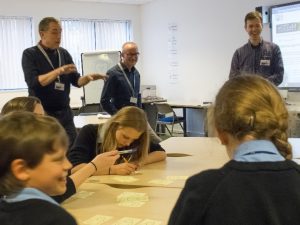
Professor Richard Holliman, The Open University. Photo: Michael Francis.
“The science faculty in your local university needs you!” could have been the headline on the recent Guardian article about the RCUK-funded School-University Partnership Initiative (SUPI).
There is much to commend in the article and in the activities fellow SUPIs have developed, delivered and assessed over the previous four years.
Is there a problem with the article?
I argue that this article is part of a wider discourse that limits how school-university engagement with research is planned for, enacted, represented and, ultimately, valued. But why should we care?
Why should students, teachers and researchers engage?

School-University Partnership Initiative (SUPI); Call for Proposals (RCUK, 2012)
I argue by framing the wider set of purposes for SUPI so narrowly, as if university scientists are the recruiting sergeants for their institutions, the Guardian article does not do our work or the wider range of purposes for this RCUK-funded initiative justice.
First and foremost, yes, RCUK did require each of the 12 SUPI partnerships to “inspire the next generation”, but this requirement also went beyond recruitment:
“…RCUK aims to enhance the experience of contemporary research for young people, encouraging more young people from a diversity of backgrounds to pursue relevant studies beyond 16, follow research careers and enabling more to act as informed citizens” (RCUK, 2012, my emphasis].
In our experience, which is matched by research findings (Jensen and Holliman, 2016; Holliman and Jensen, 2009), the recruitment of future university students often becomes the default purpose for school-university activities. The result is often that the potential to directly and authentically engage children and young people with research can be lost.
Further, the objectives for these activities can be narrowly framed in ways that can’t be assessed. Put simply, “Did more children and young people sign up for university courses as a result of a one-off intervention on the part of a university researcher?” is rarely going to be SMART (Specific, Measurable, Achievable, Realistic and Timely).
(I’ve yet to encounter school-university engagement activity that offered children and young people a genuine opportunity to make an informed decision not to go to university, or not to apply as a school-leaver.)
The recent call for a “collective need to do more to take science to those not currently engaged” (House of Commons, 2017, p.3), means that we should be celebrating and supporting efforts to genuinely and meaningfully engage children and young people regardless of their academic trajectory.
Put simply, children and young people should have a voice in research (Kellett, 2011; Fricker, 2007). The neglected students of today will become the hard-to-reach audiences of tomorrow.

We asked students what attributes they wanted to see in university researchers visiting their school. They responded: be positive, inquisitive imaginative and creative (Collins et al., 2015). Photo: Mark Russell.
Second, the SUPI initiative was about school-university engagement with research, not just science. In working with local schools in Milton Keynes, we have run activities involving researchers working in business and law, education, media, design, technology, mathematics and the social sciences.
Science is not the sum total of the research world; expanding this to STEM to address a ‘skills gap’ in the economy (e.g. see House of Commons, 2017) merely extends the same limitation.
Skills for lifelong citizenship
If school-university engagement with research is to offer opportunities for all students to become informed citizens, we should be supporting children and young people as they develop lifelong skills in citizenship (Holliman, 2016). This includes sophisticated information literacy skills.
Researchers have a responsibility to ensure that their research is both open and easily accessible (Weller, 2014). They should also ensure that children and young people are given structured opportunities to develop skills in accessing, filtering, analysing and responding to that information. This can require that researchers engage beyond their home disciplines, supporting students and teachers in skills development rather than knowledge acquisition.
Through our SUPI work, Open University researchers worked with teachers from across the Denbigh Teaching School Alliance to support students studying for the Extended Project Qualification.
If researchers are successful in engaging with children and young people and teachers, they will have greater opportunities to critically engage with different forms of research, both in terms of processes of investigation, insights, and the ways these forms of knowledge are verified.
Adapting the ASPIRES project’s helpful conceptualisation of ‘science capital’ to become ‘research capital’ could be a helpful place to start.
Resources
We have produced a dedicated web page hosting resources relevant to school-university engagement with research. This includes links to the resources OU researchers and library staff developed with local teachers in Milton Keynes to support the Extended Project Qualification.
Acknowledgements
This post discusses work that was organised through the RCUK-funded School-University Partnership Initiative (SUPI). From 2013-2016, the Open University worked in partnership with the Denbigh Teaching School Alliance through the ‘Engaging Opportunities‘ Project.
